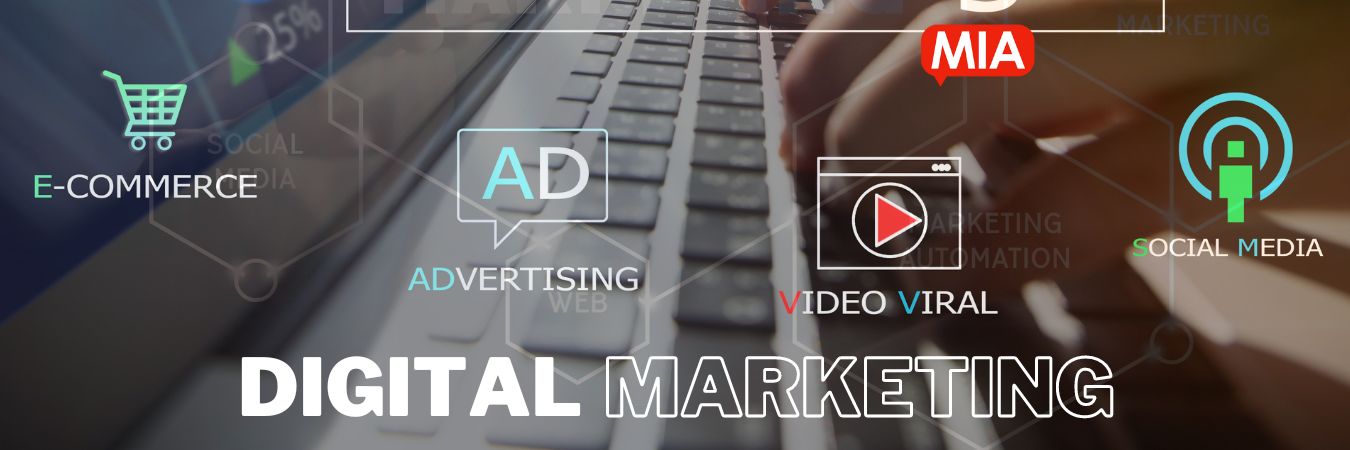The phrase digital marketing is becoming more and more relevant in the world of business. In this article, we will provide an overview of digital marketing and the various components of digital marketing.
In this article:
- Digital marketing: a brief introduction
- Components of digital marketing
- Is there any must have digital marketing component?
- Conclusion
Digital marketing: a brief introduction
Digital marketing uses digital tools to promote, market, and sell products or services. With these tools, businesses can improve their efficiency and reach various audiences. Traditional advertising methods, such as print ads, may not be as effective in today’s age, where people are more accustomed to social media. Digital marketing helps companies reach consumers on a broader scale by understanding their habits and interests through data.
How does digital marketing help a business? Digital marketing has the potential to help businesses in a variety of ways. For example, social media can be used for content marketing which helps deliver more relevant information about products and services to consumers without any extra effort. This can result in increased customer loyalty and interaction because people stay connected to brands through social media.
Components of digital marketing
To ensure your digital marketing strategy is successful in the future, it is mandatory to understand the different types of digital channels. However, digital marketing is a broad term that can refer to several different activities and strategies and has eleven main components:
1. Content Marketing. For marketers, content is king. It is the most critical factor in digital marketing because consumers are more likely to purchase a product or service if they are well-informed about it. The right content can increase a company’s conversion rates and improve its website rankings. The term “content marketing” was first coined in 1996 at a journalism conference by John F. Oppedahl, giving it a useable name to recognise the practice. Ever since content marketing has been an undefeated marketing trend.

Content Marketing offers a way for companies to create, distribute and measure their marketing content. As a result, It is no surprise that many companies are taking this route to gain more exposure. According to Content Marketing Institute (CMI), 93% of B2B marketers use content marketing. Further, despite the massive success of content marketing, 72% of the startups in a study reported that they were not skilled at it and were unable to create engaging content.
Also read: MIA Research Report – Five Marketing Moves That Startups Must Not Miss
2. PPC Advertising. PPC Advertising is a component of digital marketing that allows businesses to place ads on search engine results pages. It is a type of paid search advertising, an online marketing method in which advertisers pay to have their ads shown on search engine result pages. These ad placements have the potential to be both highly effective and very expensive. Examples of PPC include AdWords, Google AdWords, Bing Ads, Facebook Ads, Yelp’s local business results, and targeted AdWords campaigns. Marketers can set up PPC campaigns on Facebook, Google, Bing and LinkedIn and show their ads to people browsing the sites.
According to research an average of 10% of the paid media budget goes into this category. PPC campaigns are an effective way to segment your buyers and target specific interests or locations. Furthermore, most PPC platforms focus on the top two of these segments: demographic-based targeting and interest-based targeting.

3. Search Engine Optimization(SEO). As the digital marketing industry evolves, search engine optimisation has become critical to winning business. SEO allows companies to not only provide their audience with more relevant content but also to rank higher on SERPs. SEO is how companies can increase their traffic to place their website consistently at the top of any search results page. This increases visibility and popularity, leading to better sales, profits and overall success. With increased traffic and better rankings, digital marketing has proven to grow brands and generate revenues.
4. Affiliate Marketing. Affiliate marketing is a component of digital marketing that involves partnering with other companies to market their products or services by earning commissions on your sales. Advertisers use affiliate marketing as a means to an end, as it is less costly than direct advertising. Affiliate marketing can be broadly broken into two categories. You are either an affiliate marketer yourself, or you work for an ad agency that creates and manages the campaign on behalf of the advertiser. Affiliate marketers may also be called “distributors,” “resellers,” or “agents.”
Also recommended: 7 Great Affiliate Marketing Strategies To Implement
5. Social Media Marketing. Social media marketing has been around for a long time, with the first platform, “Myspace,” created in 2003. Thereafter, it is has now evolved into an essential component of digital marketing. Social media marketing is an interactive marketing strategy where marketers create social media profiles and then use those to market their brand. The goal of social media marketing is to reach customers and potential customers through a variety of digital channels. Further, The World Federation of Advertisers has stated that traditional advertising (such as print, television, and radio) has fallen disproportionately in comparison to the growth rate of social media.
6. Video Marketing. Video marketing is an effective digital marketing tool; it helps establish trust and credibility. It also boosts conversions and generates leads. Furthermore, videos can be easily shared on social media platforms such as Facebook, Instagram, YouTube and more YouTube. Video marketing is often used by brands to demonstrate the benefits of their products. Brands often use video marketing. Video testimonials can also be a powerful marketing asset. For instance, there’s a video for the Bragi Headphone product. It demonstrates how much better one can hear wearing this product over traditional headphones [1]. Companies use video marketing to create eye-catching content or reels and share them on social media.
Nevertheless, video marketing is pretty expensive and difficult to do owing to which a lot of startups give it a pass, with only 30% giving it a try.
Also read: How Video Marketing Can Be Beneficial in Retail Business
7. Email Marketing. Email marketing is one of the most effective and broad digital marketing strategies. With emails, one can reach out to customers directly or aid in generating leads in the form of webinars, sales promotions, informational materials, and more.
Data shows that 55% of startups send personalised offers and emails to customers to build engagement and emphasise their brand. Those who don’t follow this practice (72%) say they cannot create engaging content.

8. SMS Marketing. SMS marketing is a new form of digital marketing that allows companies to reach their customers without incurring additional costs. In recent years, this strategy has been used by many industries, such as real estate, retail, and healthcare. The method commonly used by companies is to send short text messages to their customers in the form of a promotional offer, discount code, or announcement. When done correctly, the process of SMS marketing is low-cost while reaching a large number of customers.
Also recommended: MIA Research Report: Best Brand Building Practices- What Experience Teaches Businesses
9. Marketing Automation. It is no secret that digital marketing has changed the way marketers used to capture leads, convert them into customers, and grow their businesses. However marketing automation is the flag bearer of this change as it allows users to make decisions based on data collected from other sources. Realised through automation software, it helps companies manage large volumes of customer data across multiple touchpoints. Marketing automation software has also been increasing in popularity among SMBs due to its speed and ability to provide rapid turnaround on customer interaction and decision-making.

10. Website Marketing. In the digital age, virtually every business is moving to the web. From e-commerce to social media marketing, digital marketing is crucial to any company’s strategy. It has become essential for companies to have a professional website that helps them reach their target audience while presenting their brand attractively and professionally. A website should represent a company’s brand and services in the best possible way. Whenever possible, it should provide clear and concise information that is easy to follow and understand and should be fast, mobile-friendly and adaptive.
11. Web Analytics. Web analytics is a powerful tool that provides marketers with valuable insights about their website’s performance and should be one of the must have digital marketing components. This technology allows companies to track key metrics such as visits, traffic sources, conversion rates, bounce rates and more.
Is there any must have digital marketing component?
Digital marketing has evolved rapidly in recent years. It is now a strategic tool for any business, and companies are looking for the best way to integrate it into their marketing strategy. You can use various channels to further your digital marketing strategies, such as search engine optimisation (SEO), social media, mobile apps and website design. However, the best channel for digital marketing depends on your business type and goals.
How are you going to use these digital marketing components in your strategy? For instance, if you want a tool that will enable you to create content, promote yourself and find customers, websites are the best channel for digital marketing. Websites allow you to post reviews of your business or services, share or market content through blogs and social media posts, write articles on your website and set up a blog or podcast. You can also run an email list that can be the basis for your email marketing strategy.
Conclusion
The digital marketing industry is constantly changing and evolving. Therefore, it is essential to stay on top of the latest trends and changes to maintain a competitive edge. Practising digital marketing incorrectly can be detrimental and lead to a lack of customer engagement. A full-service approach is advised for those who want to develop their digital marketing skillset.
Endnotes
- https://www.youtube.com/watch?v=AQnoeiZeMCE












